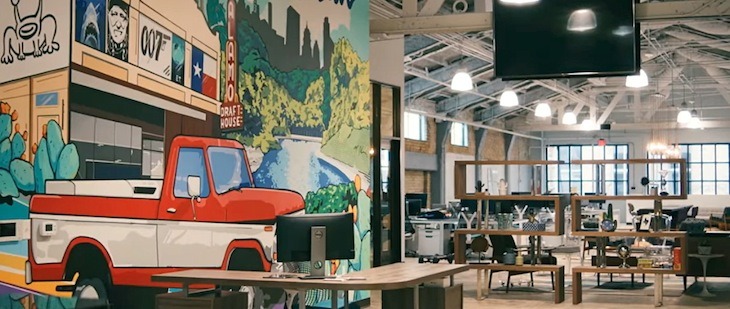Walmart recruiting tech talent deep in the heart of Texas
by March 20, 2018 3:56 pm 1,573 views

Walmart ATX, the 8,000-square-foot renovated warehouse in downtown Austin, Texas, opened in December as one of two technology hubs to innovate with the retailer’s larger technology labs in Sunnyvale, Calif., and Bentonville.
Walmart recently opened a small tech shop in downtown Austin, Texas, to innovate and incubate ideas with its larger Store No. 8 project in Silicon Valley. The Austin unit, ATX, will employ about 60 when it’s up to full staff this spring.
Walmart ATX is housed in a renovated, 8,000-square-foot space that opened in December. In April, a second tech hub will open in Plano, Texas, in a co-working center known as Common Desk. The Plano hub will employ between 50 and 60 people when recruitment is completed. (See video at end of this story about the Austin facility.)
Walmart said it chose Austin as its first technology incubator outside Silicon Valley because of its tech talent pool and startup support. Plano was chosen for similar reasons, and both cities are among those being considered by Amazon for its second corporate headquarters.
“Effective use of technology is an absolute competitive necessity today, but even the most sophisticated technology can end up being a hindrance when built without first considering the users,” said Rachel Brynsvold, one of the new data scientists recruited to ATX. “We must develop best-in-class technology and deliver it with a focus on what the business and the users need.”
Brynsvold and her team are tasked with inventing the future of shopping as they innovate using machine learning, artificial intelligence and natural language processing to make Walmart more efficient. Some of that work will be aimed at helping Walmart employees with better tools to serve customers and run stores more efficiently.
“The work we’re doing is ultimately about enabling our coworkers to be even more impactful in their jobs, which is something that always gets me excited,” Brynsvold said.“I also see lots of opportunities to make a financial impact for the company, which contributes to Walmart’s mission to help people save money and live better.”
In a recent Walmart Blog post, Brynsvold said the most exciting aspects of her new job are the sheer scale of data with which the team works and access to the computer resources used for cloud processing.
“I am routinely encountering data sets that are measured in terabytes – it is difficult to comprehend that amount of information,” Brynsvold said. “The combination of that amount of data and the availability of powerful computer resources means tremendous opportunity for me to do some truly cutting-edge data science work.”
The Austin and Plano teams work with technology teams in Bentonville, at Jet headquarters in Hoboken, N.J., and at Walmart.com headquarters in San Bruno, Calif.
Walmart is recruiting applicants on its website for tech positions. The small technology hubs are strategically located outside the larger technology bases in Bentonville and San Bruno because Walmart seeks to find talent that might not want to relocate to those areas.
Just as Austin is known for being a technology hub and home to Whole Foods, now owned by Amazon, the Dallas metro area has deep roots in retail – headquarters for JCPenney and Neiman Marcus – and also has a technology base with Texas Instruments and DCX Technology.
The addition of technology jobs at Walmart outside of Northwest Arkansas does not necessarily come at the expense of local employment. Walmart’s technology career website shows more than 300 technology job openings spread between Silicon Valley and Bentonville. There were nine openings in the new Plano office listed and three openings in Austin.
Mike Harvey, chief operating officer with the Northwest Arkansas Council, recently told Talk Business & Politics one of his biggest concerns was that many technology jobs can be worked remotely. He said tech talent becomes more in demand as J.B. Hunt and other employers like CaseStack expand their technology bases in Northwest Arkansas.
“If companies can’t fill the technology jobs we have, then it makes no sense to add more,” Harvey said.
Trying to grow diversity of thought is another reason Walmart is interested in other tech hubs, said Jarrod Ramsey, former vice president of technology with Rockfish Digital in Rogers, and former president of the Northwest Arkansas Technology Council. Ramsey said areas with larger pools of tech talent can foster innovation by debating and socializing on technology issues through hackathons and think tank events that draw thousands.
“Not everyone wants to live in Sunnyvale, Calif., or Northwest Arkansas. That’s been an issue for Walmart and other employers for years,” said Ramsey, who relocated to the region many years ago.
Ramsey, who now works for Microsoft while still based in Northwest Arkansas, said cultural differences exist between tech hubs and non-tech metros. He said tech hubs have more collaboration and support for startups and innovation incubators. He said the startup work in Northwest Arkansas has come a long way in recent years, but it’s nowhere near the level of a mature region like Austin.
“We have set a firm foundation of establishing a tech pool of talent, but more work has to be done,” Ramsey said. “We need more access to affordable education and opportunities to work on innovative projects that solve real-world problems. Because of our core businesses, a lot of support and effort have gone into innovating for retail, food processing, logistics and supply chain. Other regions have a much broader base fueling innovation with a fail, fail, fail, win mentality acceptance this region is still trying to master.”
